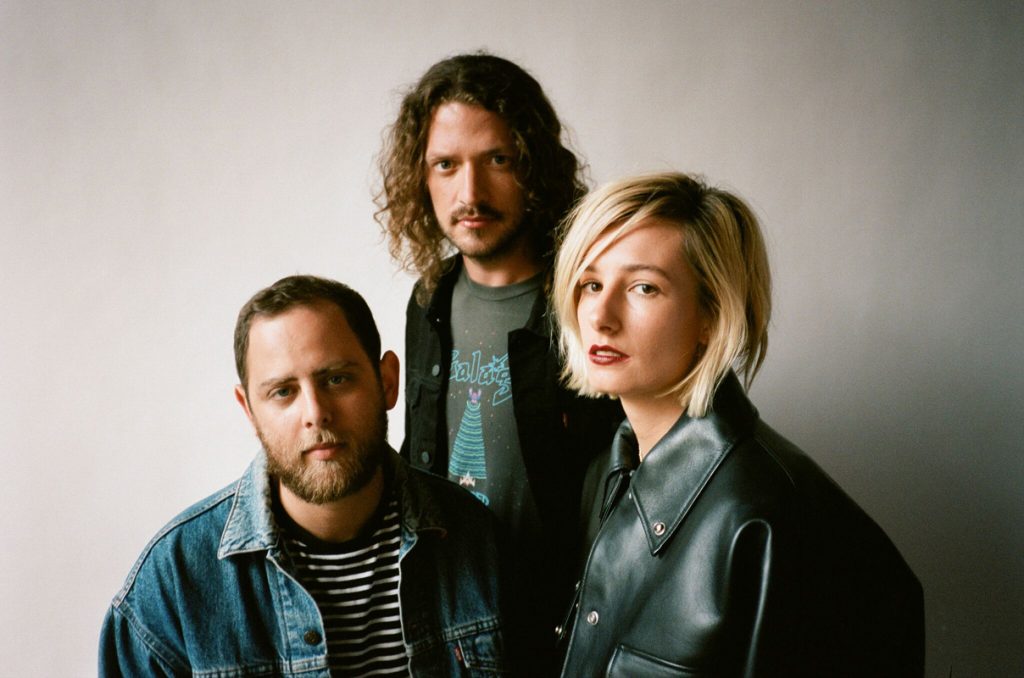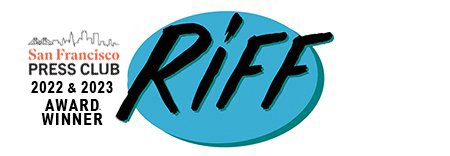INTERVIEW: Slothrust feeds on the magnetism of music

Slothrust
The new live action and hand-drawn animation video for “Peach” encapsulates the sort of magical vibe alt-rock trio Slothrust was searching for when writing and recording its 2018 album, The Pact.
BottleRock Napa Valley
May 24 to 26
Napa Valley Expo
Tickets: General admission $160-$360.
The video sees the band, which hails from Boston and spent time in New York before moving to Los Angeles, playing in a forest enchanted with animated creatures that could have come right out of Snow White and the Seven Dwarves. Singer-guitarist Leah Wellbaum said that she’s held onto the idea since the very beginning, and she credits director Jason Lester for manifesting her thoughts onto the screen.
“The thing that interested me about that concept is this idea of music energetically extending beyond the human and to all walks of life, be it animals or plants, or even inanimate objects—and it being something that’s so transcendent that there’s this magnet about it,” she said. “I’m really obsessed with magnets and this idea of music that kind of just absorbs and sucks up everything around it and draws it in and makes it a part of it. It was really exciting to me to test that.”
Contextually, “Peach” and the rest of The Pact sees the band explore the mystical and the surreal. Sonically, Slothrust’s fourth album, which the band released last fall, is its most developed and fully realized. From the pedal-to-the-metal sleaze punk of “Planetarium” to the free association wordplay over fuzzy guitars on “Peach,” the bittersweet acoustic-guitar led ballad “The Haunting,” brassy “For Robin,” introspective sultry slow-burner “Walk Away,” off-kilter “Fever Doggs” and electronic, poppy “Double Down,” the album never pauses or gets comfortable.
Slothrust was able to take more creative liberties while recording because the band worked with a professional producer (Billy Bush; Garbage, Muse, Natasha Bedingfield) for the first time and had the backing of its label, Dangerbird, which included using the Dangerbird studio and not worrying about racking up a huge bill.
For the first time, Wellbaum, drummer Will Gorin and bassist Kyle Bann used midi instruments.
“We’ve always been a band that operates more from the place of trying to capture the best live performance possible,” Wellbaum said. “We got to dig in deeper to sounds that we didn’t necessarily think we could replicate live in that way, and we didn’t worry about it. We just committed to each song individually and tried to push them each to their full potential. We’re really open to experimenting and trying different textures, and trying different arrangements; really seeing what served the piece of music the best.”
The album opener, “Double Down,” is Slothrust’s poppiest, even while it retains the band’s grungy tone. Wellbaum wrote the song with friend Jon Buscema, and has been collaborating with more songwriters as of late. She had avoided it before and associated it with mass-marketed pop.
Now she views it as a chance to meet future inspirations that could help her become a better overall musician.
“Co-writing is something that I initially didn’t think I’d be into when I was younger because I thought of it as something that was done sort of within the machine of the mainstream industry,” she said. “But … songwriting and music are just much larger than that, and it can be a really valuable experience to see how somebody else writes songs, how someone else’s mind works, and how that might interact with your ideas; how your ideas might build off of theirs.”
She’s got a pile of co-written songs sitting around; some that might end up on other artists’ albums and some that she said might make for good commercial syncs. But she also likes to write for the sake of creating, just to see where a song will lead.
The Pact’s closing track, “Travel Bug,” is a polar opposite to “Double Down.” It’s a folky acoustic melody more in the vein of Woody Guthrie. But the songs share a common lyric about rolling snake eyes, with the meaning of the line inverted and the songs acting as bookends to the rest of the album.
“‘Double Down’ is a little bit more about taking your walls down, and ‘Travel Bug’ is more about having them up quite high,” Wellbaum said.
While the words are the same, they’re contextualized as different meanings. And the building of walls on the album closer doesn’t have a negative connotation. The song is about self-exploration from a temporarily guarded place.
“I think self-reflection is really important, and you can use music as a tool to do that,” she said.
The band members’ music backgrounds—all had classical chamber experience, as well as jazz ensembles and blues groups—also played into the diversity of their collective sound. That’s something that has developed from years of playing together under different circumstances, Wellbaum said. Looking forward, she said the band will probably release classical arrangements of its catalog.
Wellbaum said she enjoys taking a small idea and expanding on it, and uses that skill at least once a month, when she performs improvisational music during a 75-minute yoga class in L.A.
“[With] a lot of the songs I write, I can think of a pretty wide range of arrangements that would work for them,” she said. “It’s about picking the right one, what we think will really translate and do what we’re looking for the piece to do.
“An hour and 15 minutes of guitar improv … is a pretty long time to be doing improv by yourself. It’s been really amazing ’cause I really do have that type of music coursing through me, and it’s great to have an outlet for that.”
While Slothrust threw caution to the wind while recording The Pact, playing the new songs live has led them to adapt what Wellbaum and her bandmates considered acceptable. In some cases, the band created entirely new arrangements.
“The three of us are just all the type of musician that is always happy to try something new and push ourselves to the next level in various ways,” Wellbaum said. “None of us are particularly complacent players. We always feel there’s something to be learned.”
For other songs, the band pulled samples and recorded some parts to backing tracks. While that has become commonplace in rock, Slothrust had been avoiding doing it until now.
“I’ve always been kind of old-school like that,” Wellbaum said. “The idea of utilizing electronic sounds and loops as opposed to just playing an analog instrument was kind of unfamiliar to me. … But as I’ve seen more artists do it, I’ve sort of started to embrace it, because it really texturally opens up what’s possible on stage without hiring a bunch of new players.”
Follow editor Roman Gokhman at Twitter.com/RomiTheWriter.
